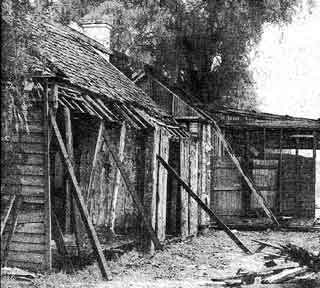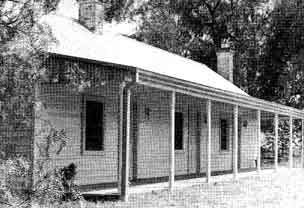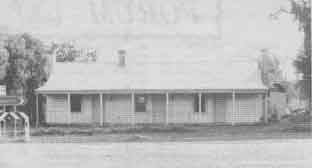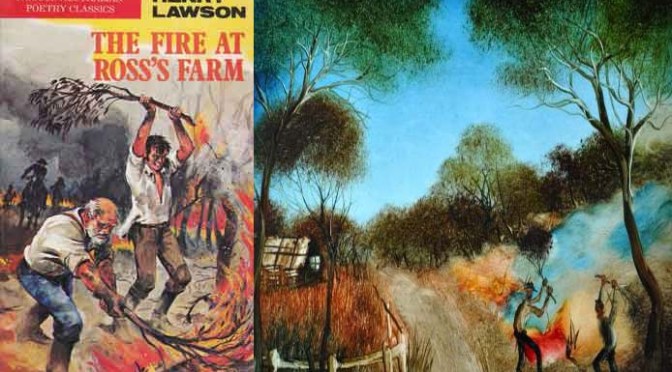Old Land Title Certificates are full of historical information. The wording of them is quaint, to say the least. The Title Certificate for the Budgee Budgee Inn was issued in 1861 after a grant of land was sold at ‘upset price’ of £43 following an attempted sale by auction. It was part of a purchase of 43 acres of crown land.

It read in part—‘Victoria by the Grace of God, of the United Kingdom of Great Britain and Ireland, Queen, Defender of the Faith and so forth:- To all of whom these presents shall come Greetings.’ That was the preamble to the purchase of land on August 1, 1861 by George Leeding.
In 1864 the original three-room building, with outhouses at the rear was built of vertical slabs, between the top and bottom plates, with hip ended roof, framed up in timber rounds, and clad in shingles.
In 1865 the interior was decorated with wall paper. This would have been done after hessian or unbleached calico was nailed to the slabs. This would then have had newspaper pasted on to it as a base for the wallpaper. In 1865, Alex Chesterman was the ratepayer.
Two years later the inn was mortgaged for £200 to Richard Crossing, who operated The Settlers Store in Mudgee. By 1870 the Inn and the remainder of the land had passed to William Hill, a farmer.
Budgee Budgee Inn, at the junction of Cassilis and Wollar Roads, was from 1873 to 1890 owned by William and Sarah Gossage and their family who were the licensees. In 1881 two rooms at the southern end of the building were constructed.
The licensee was Edward Gossage from 1900 to 1908 whilst James McDonnell was the proprietor for the next three years when the Inn closed in 1911 for a short period. It is not known when the Inn re-opened but in 1919 the licensee was Arthur William Clarke.
In 1928 the Budgee Budgee Inn lost its liquor licence and the hotel closed but the Gossage family still lived there selling sweets and soft drinks. It is thought at one time it also served as a residence for a branch of the Kurtz family. In 1943 the property on which the Inn was located was owned by the Stanford family and the buildings were used as storage sheds for hay, oats and fertiliser. The buildings, because of their age, needed urgent repairs.
In 1988 the property was subdivided and the Inn with 5 acres of land was purchased by Simon Staines and Angela Leonard who began restoration. In 1989 a car accident demolished part of the building.
In 1990 the property as it stood was purchased by Ross and Jan Webb. Reconstruction was commenced and the blacksmith’s shop was completed by September, 1990.

On March 23, 1991 Ross and Jan Webb re-opened the re-constructed Inn as a restaurant known as The Loaded Dog and a gift shop. The opening was by the late noted folklorist John Meredith, AM. The Budgee Budgee Inn is acknowledged as the location featured by Henry Lawson in his famous story The Loaded Dog. An acting version scripted by local Budgee Budgee resident Norman McVicker was performed three times on opening day by an acting group the Pipeclay Performers.
The kitchen where all the action took place no longer exists—but it is not hard to look at the present building and vividly imagine the mongrel dog with the stick of dynamite and the confusion caused among the teamsters and bullock drivers drinking in the pub.
The building is still known as the Budgee Budgee Inn but is now a private residence occupied by Adrian and Carol Terry.



You must be logged in to post a comment.